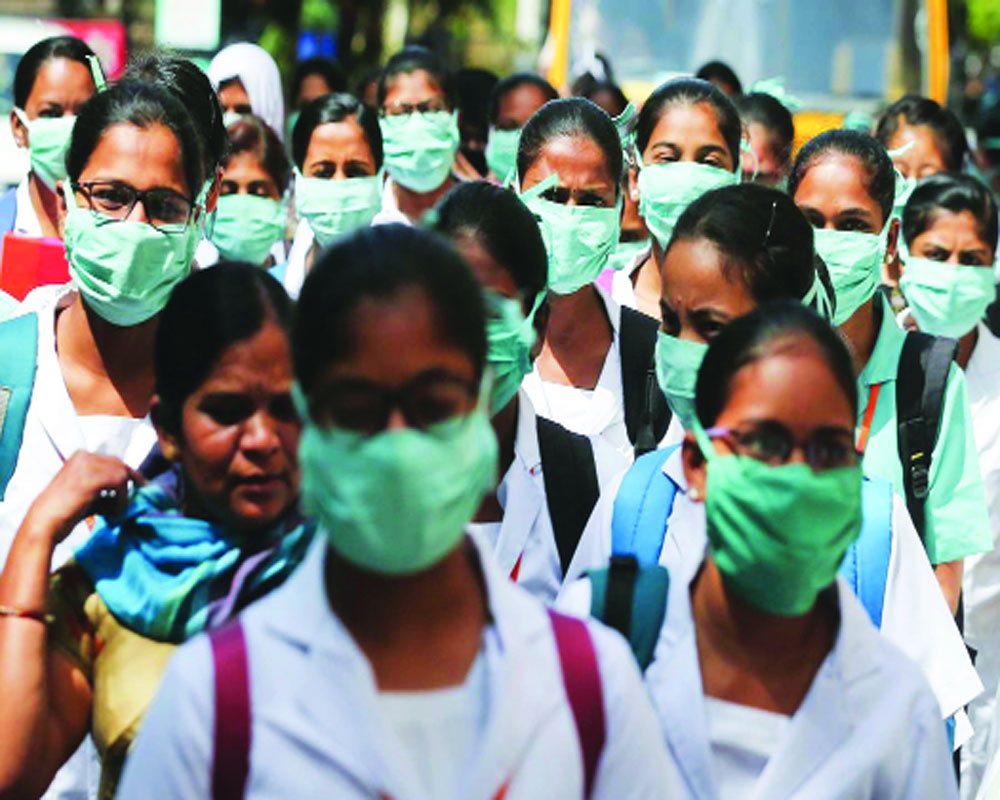Schools are the worst hit by the virus as they are gateways to a child’s engagement with the world. Now, there’s just fear
There is no doubt that apart from public health and the economy, the Coronavirus has hit our education system hard. As colleges and universities deal with truncated courses in a revised academic calendar and resort to e-learning, these are at best half-baked measures. Simply because digital connectivity, accessibility and affordability are big challenges in India’s vast, underprivileged hinterland and dots of cities are not representative enough as an alternative model of instruction. Only frontline universities are on some sort of digital grid but the rest are not. Also, students, who made it back home before the lockdown, may not be able to tune in depending on tele-connectivity issues in their home States. The percentage of people who were able to use the internet pan-India was 20.1 per cent, with rural at 13 per cent and urban at 37.1 per cent. Only 10.8 per cent of Indians used the internet in the last 30 days. Also, while senior students fret and fume over career-making tests and admissions, very little is being thought about the primary and middle schools, most of which rely on an interactive, visual and physical format of teaching. Schools and colleges are also about a natural rhythm of life. For children, they are the first experiences of life outside the cocoon of a home, the first mode of engagement with nature and the wider world. School learning being an integral part of the development process of a child, the emphasis on theoretical lessons than practical knowledge may turn out to be more of a drill. The problems encountered by students on account of home tutoring are varied. Besides, even if projects are commissioned online for execution at home, the tools for doing so, namely paper, pencils, paints, stencils, cardboards and so on, are not available now, figuring as they do in the non-essential list. Sometimes parents are ill-equipped to teach older children. In the countryside, it is worse because parents send their offspring to school simply because of the mid-day meal programme. No school means we are staring at a major nutritional deficiency among children till the secondary level. Psychologists are already fearing that this could be an emotionally scarred generation as they are confined indoors for prolonged periods based on a fear of the unknown. Besides, there are far too many gaps in online education for seniors, too, at this point of time. Lectures and teaching may have resumed without much hindrance but without access to libraries and laboratories, there is no way of gauging students’ application skills.
It was to tackle such issues that two expert committees were formed to look into the ways of conducting exams in universities amid the lockdown and work on an academic calendar in a post-Covid scenario. Keeping in mind region-specific challenges, the recommendations include allowing universities the flexibility to conduct online courses and exams, depending on the availability of facilities. Further, the panel has suggested a six-day class schedule post-normalcy to make up for the lost time and a 40 per cent weightage to online performance in grading students. Experts have also recommended a more holistic assessment module whereby teachers can factor in the marks obtained by students in the last academic year to evaluate their consistency and then decide their grades. Presentation-based assessments and a two-hour exam module instead of the previous three-hour format are also on the cards. Indeed, such clarity was badly needed to keep students, particularly the younger lot, invested in signing up for online classes in the first place. Besides, a graded exit strategy means there is already an added performance pressure on students to finish their courses faster than usual. At the moment, student anxieties are focussed on incomplete board exams, which need to be completed either online or offline, depending on the lockdown continuity. Going forward, policy makers need to revitalise our education satellite programmes as a credible distance learning tool. Counselling sessions need to be organised to help students absorb the impact of social distancing from their peers. There needs to be a new discipline for the rough and tumble of sports or even cultural group activities. Of course, in the longer run, the education budget, like that of health, needs to be hiked. Enhanced social sector budgeting can only rescue us in the long haul if we want to capitalise on India’s young demographics.
(Courtesy: The Pioneer)








 OpinionExpress.In
OpinionExpress.In















Comments (0)